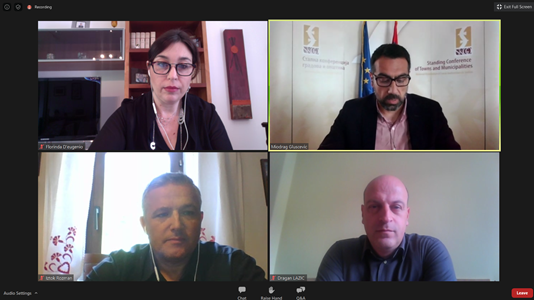
The second panel of the series of NALAS webinars concerning Solid Waste Management in times of the COVID-19 pandemic, gathered over 30 participants on 27 May 2020. This panel focused on safety, both in terms of public health and the employees in utility companies at their workplace.
The discussion was moderated by Mr. Miodrag Gluščević, Programme Director at the Standing Conference of Towns and Municipalities of Serbia and a host of NALAS Task Force on Solid Waste and Water Management with the expert panel including:
- Ms. Florinda d’Eugenio, International Relations Consultant, Frisoli s.r.l. Rome, Italy
- Mr. Iztok Rozman, Chamber of Commerce and Industry, Chamber of Public Utilities, Slovenia
- Mr. Dragan Lazic, Regional Landfill Eko-Dep, Bijeljina, Bosnia & Herzegovina
On this panel, the role of waste management service providers in maintaining public health and the cooperation of the local government and PUCs with other public bodies like the health care sector as an important aspect of this type of crisis, were highlighted. The panel also touched upon another important but often neglected aspect of waste management during this crisis, and that is the informal sector and how does the crisis affect waste pickers in terms of health risks but also economically.
One of the general conclusions of the panel was that the COVID-19 crisis has a great impact on the waste management sector and the service provision. During the progress of the pandemic and the lockdown, local authorities and public utility companies had to adapt to new circumstances and ensure the provision of the services in such extraordinary conditions.
Ms. Florinda d’Eugenio, shared that in Italy, the response to the coronavirus epidemic at the local level had to go in two directions. First of all, it was necessary to react quickly and adjust the services to prevent the spread of the virus. Then, amendments to the current regulation on waste were needed, to fill the gaps in service provision caused by changes in waste quantities and morphology.
Furthermore, to prevent the spread of the virus in Italy a clear instruction was given to municipalities and waste operators to distinguish between the waste coming from the medical institutions, mandatory isolations, quarantines, and households with infected citizens, the so-called contaminated waste on one hand, and the waste produced by the general population, on the other. These types had to be handled separately with different priorities in treatment. No separation was practiced with the contaminated waste, and in some regions, PUCs have been instructed to organize specific shifts to collect it and send it as a priority for incineration.
With this type of pandemic, it is not necessary to stop separate waste collection from the general population, but in that case, it is critical to dispose of protective equipment such as masks and gloves, but also wipes and disinfectant packaging in special bags that need to be tightly closed, left for 72 hours and only then dispose of with the mixed waste, emphasized Mr. Iztok Rozman. He also shared that in Slovenia, at the peak of pandemic, certain facilities, like recycling yards, have to be closed to avoid waste handlers and workers sorting the waste from being exposed to the risk and even infected. An interesting detail related to the disposal of protective equipment (gloves and masks) and tissues is that, in Slovenia, for example, but also in other places, such materials appeared to a greater extent in wastewater treatment plants, showing that communication with citizens need to be even more intense during crisis times.
Discussion at the panel disclosed that the perception of communal services, including waste management, as an important and irreplaceable precondition for normal functioning and living in the local communities is at a high level and that citizens are ready to follow the instructions that go in the direction of maintaining communal hygiene and public health. It was recognized that the measures regarding the reaction to COVID pandemic in all European countries are similar and that the differences only occur where the different waste treatment technologies are available.
In a crisis like this one introduction of the measures to prevent contagion among workers is one of the crucial issues in the effort to sustain the uninterrupted provision of waste management services. An excellent example in this sense is the organization of daily shifts at the regional landfill Eko-Dep in Bijeljina, where the work was organized so that workers from different shifts did not come into contact, and the facilities that they use were regularly disinfected after each shift was done, as illustrated by Mr. Dragan Lazic.
Participants of the panel, as well as the audience through the poll question, were unanimous in a view that after the medical services, utilities including waste management services, are the most important for maintaining public health and hygiene safety.
Throughout the discussion, it was concluded that public bodies, and when it comes to waste management those are local authorities and public utility companies, have the obligation to maintain the system and keep it running. So, if in any instance the citizens act inappropriate or don’t know what to do whit the waste, actually the system has failed. This is what needs to be prevented with efficient organization, good communication, precise messages, public health protection, and reliable execution of the services.